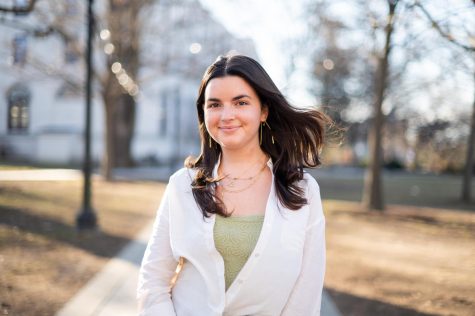Indigenous Perspectives Shed Light on Climate Change
October 3, 2021
On Sept. 22, members of the Villanova community gathered virtually for “Indigenous Perspectives on Climate Change,” the latest event in the “Turning Points in History” 2021-22 event series presented by the Albert Lepage Center for History in the Public Interest.
The event, co-sponsored by the University’s Department of Geography and the Environment, was the second in the month of September, during which the series highlighted environmental and climate issues.
Lepage Center Director Elizabeth Kolsky, Ph.D., discussed the significance and purpose of this event and the overall series in her introduction.
“We’re looking to history to help us make sense of the crazy world around us,” Kolsky explained.
To make sense of climate change in our crazy world, the webinar brought together Clint Carroll, Elizabeth Hoover and Daniel Wildcat to discuss the issue from a Native American and indigenous perspective, corresponding with their respective areas of expertise. Paul Rosier, the University’s Mary M. Birle Chair in American History, served as moderator to guide the conversation.
The evening’s discourse was divided into several overarching thematic questions on climate change and the native experience. Each speaker spoke to the topics from their particular point of view. Rosier began the discussion by asking the speakers how they have seen climate change already affect indigenous communities.
Wildcat, Director of the Environmental Research Studies Center at Haskell Indian Nations University, explained the unique burden of global warming and the changing climate on native communities.
“Native Americans are particularly vulnerable to climate change because of where we live and our cultural practices that are interconnected with and dependent on the land,” Wildcat said.
Carroll, Associate Professor of Native American and Indigenous Studies within the University of Colorado-Boulder’s Department of Ethnic Studies, added to Wildcat’s comments, pointing out the “paradox of vulnerability” to which these communities are subjected.
“We in our communities are often the most susceptible to the effects of climate change despite the fact that we have done the least to cause them,” Carroll explained.
Hoover, Associate Professor in the University of California-Berkeley’s Department of Environmental Science, Policy and Management, agreed. She Zoomed into the event from Alaska, where she is conducting work and research surrounding Native American environmental health and food sovereignty. She added that these ways in which indigenous peoples have already been affected by climate change link directly to present and future issues.
The speakers also discussed the complex necessity of mitigating climate change from an indigenous lens, largely by shifting cultural perspectives toward traditional native practices and nature itself.
“Mitigation from an indigenous standpoint requires a radical change in world view,” Carroll said.
Wildcat agreed, explaining that major current climate issues are anthropogenic, or originating in human activity, and are compounded by the delegitimization of native voices at the table of mitigation discussions.
In terms of particular mitigation efforts, the speakers discussed the interaction between indigenous peoples, major environmental or policy organizations and federal or state governments. On this topic, Hoover particularly pointed to the importance of regional grassroots indigenous efforts making concrete change in their communities and beyond through advocacy.
Discussing progress on the federal, scientific and political levels, the speakers seemed split. On one hand, they agreed that the United States and Western culture as a whole has a long way to go in legitimizing native voices in these spheres.
Despite past and present shortcomings, however, Wildcat seemed hopeful toward future acceptance of indigenous findings and expertise within the Western environmental scientific community
“My hope resides in the fact that I think younger scientists are much more open to understanding the epistemological trappings of the way science used to be taught,” Wildcat explained, referring to the narrow-minded, Westernized scientific instruction of years past.
Continuing the theme of looking forward, the panelists spoke about what young people can do to address some of these issues and avoid falling into the trap of disillusionment or losing hope.
“It’s easy to get overwhelmed when you see all this information and news that it’s too late, that we’ve passed that deadly tipping point,” Hoover said. “But it’s important to get outside and start small, with community projects close to home.”
The event ended with a short question and answer period moderated by Rosier, in which students could ask the speakers about their areas of study and topics touched on during the discussion.
A recording of this discussion and of all previous events in the virtual series can be accessed on the Villanova YouTube channel or through the Lepage Center’s website.
The “Turning Points in History” events series will pick back up in October, and its monthly focus will surround the history of white supremacy and the threats it poses to present society. The first event of the month, “White Supremacy and Classical Athens: A Turning Point?” will take place Oct. 6 at 6 p.m. via Zoom.











